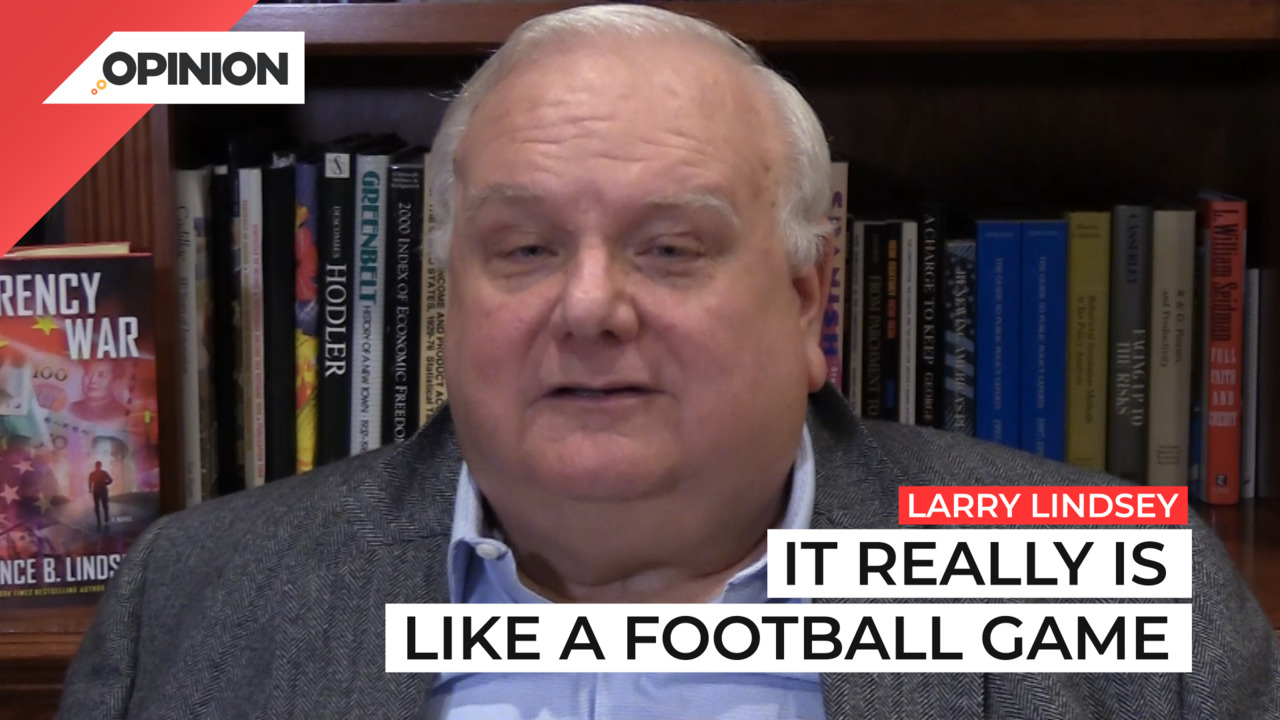
Commentary
-
Our commentary partners will help you reach your own conclusions on complex topics.
Straight Arrow News is doing something new this year. It’s having regular podcasts to cover election night. My team and I, I’m Larry Lindsey, will be running the desk and reporting on returns as they come in and more importantly, trying to project what’s going to happen before races are actually called. It’s going to be an exciting night. It starts around seven. Polls will be closed in Indiana, Georgia, Virginia and Florida.
Georgia, as you probably know, has a very tight Senate race between incumbent Senator Warnock and Herschel Walker, his challenger, who is a very famous football star. Race is tight, probably going to go to a runoff, but it will be closely watched. There’s also an interesting senate race and governor’s race in the state of Florida. The big attention will be on Ron DeSantis running for governor and probably the margin that he builds up. He is often spoken of as a 2024 Republican presidential nominee. The races in Virginia and Indiana are focused on U.S. House. And there’s an interesting strategy here that we want to examine. It isn’t commonly discussed, and that’s the efforts by the Republican party to run a more diverse set of nominees. It seemed to have worked for them in 2020 and they’re going to try it again this year.
So for example, there’s an African-American candidate running in Northwest Indiana around Gary, who happens to be a Republican. In Virginia, there are three incumbent democrats, all white women running for seats. They are being challenged by the republicans with one white woman, one Hispanic woman, and one Vietnamese male. It’s a very diverse grouping, if you want to think of them as republicans. There’s the same kind of issues throughout, diversity issues, throughout the entire night. And the trends here will be closely watched. At 730, we have polls closing in North Carolina and Ohio. Both with very close senate races, Bud versus Beasley in North Carolina, Vance versus Ryan in Ohio. At eight o’clock, we have a very…close race. It actually wasn’t thought to be, but it’s turning out that way in New Hampshire, where it’s between Bolduc, a republican former general and incumbent senator Maggie Hassan. In Pennsylvania, there’s a very famous race between the television star Dr. Oz and the current Lieutenant Governor, Mr. Fetterman. Fetterman, you may know, had a stroke and had a debate performance that people in both parties described as sad.
But the diversity theme also comes up in Texas, for example. There are three close House races in the Rio Grande Valley. The Rio Grande Valley has not elected a Republican to Congress since the mid-1800s – until this June, when Mayra Flores picked up a seat in a special election by surprise. This alarmed the Hispanic Caucus, which has traditionally tried to count the Hispanic vote as its own. They refuse to even admit her to the caucus even though she will be…she is, the first U.S. member of Congress in history from either party to have been born in Mexico.
In Rhode Island, there is Mayor Fung is challenging Ira Magaziner for a House seat. And in Michigan around the area of Detroit, which is a very African-American city…it is the home of Motown for example, the only African-American running is a Republican, John James. So the diversity issue is really an important one to follow that night and we will be.
At nine o’clock we have a very interesting set of poll closings in Arizona and Wisconsin. Both races are considered very close. And in New York, Lee Zeldin, a Republican, is challenging incumbent Governor Hochul. Now, New York is more than two-to-one Democrat by registration. But the race is close because of a high crime rate in New York. The fact that it’s very close at the top of the ticket has placed nine House seats into the toss-up category in the state of New York. So that will be interesting to follow up.
At 10, we have a poll closing in Nevada and a very tight Senate race between Adam Laxalt and Catherine Cortez-Masto, as well as two House seats now held by Democrats that are competitive. This is going to be a long night. We’re probably going to run from seven o’clock at night to one in the morning. It really is a lot like a football game or a horse race. We’re going to cover it as such. There’s a lot of competition. We’re geeks, I admit, but it is fun. It’s fun to watch, and we hope that you will enjoy the coverage
-
Election 2024 will boil down to the Great Lakes states
Pollsters and pundits have been engaged in a long debate about how Biden or Trump might win the 2024 election, with much of their focus spent on the “swing state” electoral battlegrounds. While the winners of Alabama or California may be obvious, for instance, who wins Pennsylvania is a more difficult question. Watch the above… -
Why the Fed should consider Theory of Reflexivity when fixing policy
The Theory of Reflexivity, often used in the context of economics and financial markets, implies that investors don’t base their decisions on reality but on their perceptions of reality. This creates a feedback loop where investors’ perceptions influence economic fundamentals, which in turn alter investor perceptions. Watch the above video as Straight Arrow News contributor… -
Federal Reserve surpassed its own wildest expectations
On May 14, the U.S. Bureau of Labor Statistics released the most current producer price index (PPI) report, which showed an increase of 0.5% month-over-month in April. After the report’s release, U.S. Federal Reserve chairman Jerome “Jay” Powell said that while he believes the current policy rate is restrictive by many measures, the Fed needs… -
Polls give slight advantage to Trump in Electoral College
With the U.S. general election only six months away, leading candidates President Joe Biden and former President Donald Trump appear to be engaged in a very close contest. In their 2020 race, the winner of the Electoral College was ultimately determined by a relative handful of voters in just a few swing states, even though… -
College sports is big money but not everyone benefits
March Madness has wrapped up and Caitlin Clark has emerged as a household name as well as a wealthy student athlete. Earning over $3 million throughout her college career, her success stands in stark contrast to the previous notion that collegiate athletes shouldn’t earn anything beyond their scholarship. Straight Arrow News contributor Larry Lindsey examines…
Latest Opinions
-
 Getty Images
Getty Images
USDA pauses scholarship funds directed toward HBCU students
-
 Reuters
Reuters
Trump returns to CPAC, criticizes Biden and comments on Ukraine deal
-
 AP Images
AP Images
Trump’s Department of Justice removes database tracking police misconduct
-
 Getty Images
Getty Images
DOE to investigate Maine Education Department over trans athletes, Title IX
-
 Reuters
Reuters
New coronavirus discovered in bats similar to COVID-19
Popular Opinions
-
In addition to the facts, we believe it’s vital to hear perspectives from all sides of the political spectrum.






